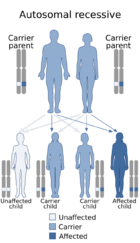Medicine:2-Methylbutyryl-CoA dehydrogenase deficiency
| 2-Methylbutyryl-CoA dehydrogenase deficiency | |
|---|---|
| Other names | 2-Methylbutyryl glycinuria or Short/branched-chain acyl-CoA dehydrogenase deficiency (SBCADD),[1] |
 | |
| 2-Methylbutyryl-CoA | |
2-Methylbutyryl-CoA dehydrogenase deficiency is an autosomal recessive metabolic disorder.[2] It causes the body to be unable to process the amino acid isoleucine properly. Initial case reports identified individuals with developmental delay and epilepsy, however most cases identified through newborn screening have been asymptomatic.
Signs and symptoms
SBCADD is included as a secondary target condition in most newborn screening programs, as the key analyte is the same as is used to identify isovaleric acidemia.[3][4] Most cases have been Hmong individuals, who are asymptomatic.[5] There are isolated case reports where individuals have been identified with SBCADD in addition to developmental delay and epilepsy. It is currently unclear what the complete clinical presentation of SBCADD looks like. There is some concern that these cases with additional symptoms may reflect an ascertainment bias rather than being a true representation of the clinical spectrum of the disease.[1] Currently, there is no accepted treatment, as most affected individuals do not require any. Some recommend avoidance of valproic acid, as it can be a substrate for 2-methylbutyryl-CoA dehydrogenase.[5]
Cause

The disorder is caused by a mutation in the ACADSB gene, located on the long arm of human chromosome 10 (10q25-q26).[1][6] It is inherited in an autosomal recessive manner, which means an affected individual must inherit one copy of the mutation from each parent.[2]
Diagnosis
Most individuals with SBCADD are identified through newborn screening, where they present with an elevation of a five carbon acylcarnitine species.[1] Confirmatory testing includes plasma and urine analysis to identify the carnitine and glycine conjugates of 2-methylbutyryl-CoA.[1]
Treatment
References
- ↑ 1.0 1.1 1.2 1.3 1.4 Online Mendelian Inheritance in Man (OMIM) 2-Methylbutyryl-CoA dehydrogenase deficiency -610006
- ↑ 2.0 2.1 Kanavin, O. J.; Woldseth, B.; Jellum, E.; Tvedt, B.; Andresen, B. S.; Stromme, P. (Sep 2007). "2-methylbutyryl-CoA dehydrogenase deficiency associated with autism and mental retardation: A case report". Journal of Medical Case Reports 1: 98. doi:10.1186/1752-1947-1-98. PMID 17883863.
- ↑ Watson, M. S.; Mann, M. Y.; Lloyd-Puryear, M. A.; Rinaldo, P.; Howell, R. R. (2006). "Executive Summary". Genetics in Medicine 8 (Suppl 1): 1S–252S. doi:10.1097/01.gim.0000223891.82390.ad. PMID 16783161.
- ↑ American College of Medical Genetics Newborn Screening Expert Group (2006). "Newborn screening: Toward a uniform screening panel and system--executive summary". Pediatrics 117 (5 Pt 2): S296–S307. doi:10.1542/peds.2005-2633I. PMID 16735256.
- ↑ 5.0 5.1 de Baulny, Helene Ogier; Dionisi-Vici, Carlo; Wendel, Udo (2012). "Branched-chain Organic Acidurias/Acidaemias". in Saudubray, Jean-Marie; van den Berghe, Georges; Walter, John H.. Inborn Metabolic Diseases: Diagnosis and Treatment (5th ed.). New York: Springer. pp. 277–296. ISBN 978-3-642-15719-6.
- ↑ Sass, J.; Ensenauer, R.; Röschinger, W.; Reich, H.; Steuerwald, U.; Schirrmacher, O.; Engel, K.; Häberle, J. et al. (Jan 2008). "2-Methylbutyryl-coenzyme a dehydrogenase deficiency: Functional and molecular studies on a defect in isoleucine catabolism". Molecular Genetics and Metabolism 93 (1): 30–35. doi:10.1016/j.ymgme.2007.09.002. PMID 17945527.
External links
| Classification | |
|---|---|
| External resources |
 |

